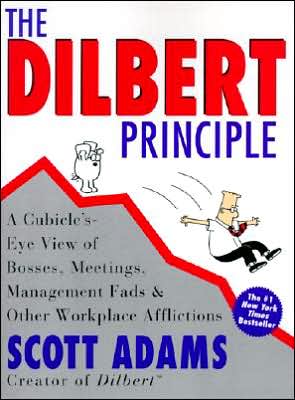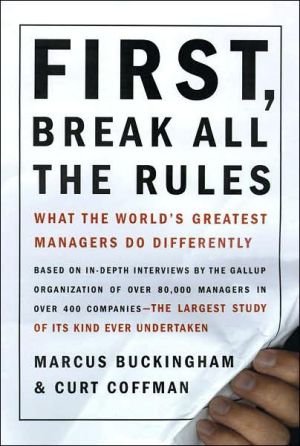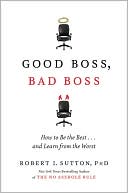Dilbert Principle: A Cubicle's-Eye View of Bosses, Meetings, Management Fads and Other Workplace Afflictions
The creator of Dilbert, the fastest-growing comic strip in the nation (syndicated in nearly 1000 newspapers), takes a look at corporate America in all its glorious lunacy. Lavishly illustrated with Dilbert strips, these hilarious essays on incompetent bosses, management fads, bewildering technological changes and so much more, will make anyone who has ever worked in an office laugh out loud in recognition.\ The Dilbert Principle: The most ineffective workers will be systematically moved to...
Search in google:
The creator of Dilbert, the fastest-growing comic strip in the nation (syndicated in nearly 1000 newspapers), takes a look at corporate America in all its glorious lunacy. Lavishly illustrated with Dilbert strips, these hilarious essays on incompetent bosses, management fads, bewildering technological changes and so much more, will make anyone who has ever worked in an office laugh out loud in recognition. The Dilbert Principle: The most ineffective workers will be systematically moved to the place where they can do the least damage — management. Since 1989, Scott Adams has been illustrating this principle each day, lampooning the corporate world through Dilbert, his enormously popular comic strip. In Dilbert, the potato-shaped, abuse-absorbing hero of the strip, Adams has given voice to the millions of Americans buffeted by the many adversities of the workplace. Now he takes the next step, attacking corporate culture head-on in this lighthearted series of essays. Packed with more than 100 hilarious cartoons, these 25 chapters explore the zeitgeist of ever-changing management trends, overbearing egos, management incompetence, bottomless bureaucracies, petrifying performance reviews, three-hour meetings, the confusion of the information superhighway and more. With sharp eyes, and an even sharper wit, Adams exposes — and skewers — the bizarre absurdities of everyday corporate life. Readers will be convinced that he must be spying on their bosses, The Dilbert Principle rings so true! Library Journal Adams worked in a cubicle at Pacific Bell for nine years. From there he went on to pen the wildly popular cartoon Dilbert, which appears in over 700 newspapers. He is also the author of six Dilbert books (e.g., Bring Me the Head of Willy the Mailboy, Andrews & McMeel, 1995) and an electronic Dilbert newsletter, has a Web site on the Internet, and is a frequent speaker at business gatherings. His latest book of humorous essays and observations elaborates on the corporate scenarios depicted in his cartoons. The "Dilbert Principle" asserts that the most ineffective workers are systematically moved to the place where they can do the least damage: management. Chapters include such titles as "Machiavellian Methods," "Pretending To Work," and "Engineers, Scientists, Programmers, and Other Odd People." The book is replete with such advice as "Never walk down the hall without a document in your hand" and "The worth of any project is how it will sound on your rsum." He stresses the importance of using the word paradigm as often as possible, discusses the value of computers in pretending to be busy, and recommends that workers awaiting performance reviews openly display copies of Soldier of Fortune magazine on their desks. This cynical, satirical, all-too-familiar glimpse of corporate life is unabashed management bashing and is very funny. Recommended for all humor and business collections.Alan Farber, Northern Illinois Univ., DeKalb
Chapter One\ The Dilbert Principle\ \ I use a lot of "bad boss" themes in my syndicated cartoon strip "Dilbert." I'll never run out of material. I get at least two hundred e-mail messages a day, mostly from people who are complaining about their own clueless managers. Here are some of my favorite stories, all allegedly true:\ \ A vice president insists that the company's new battery-powered product be equipped with a light that comes on to tell you when the power is off.\ An employee suggests setting priorities so the company will know how to apply its limited resources. The manager's response: "Why can't we concentrate our resources across the board?"\ A manager wants to find and fix software bugs more quickly. He offers an incentive plan: $20 for each bug the Quality Assurance people find and $20 for each bug the programmers fix. (These are the same programmers who create the bugs.) Result: An underground economy in "bugs" springs up instantly. The plan is rethought after one employee nets $1,700 the first week.\ \ Stories like these prompted me to do the first annual Dilbert Survey to find out what management practices were most annoying to employees. The choices included the usual suspects: Quality, Empowerment, Reengineering, and the like. But the number-one vote-getter in this highly unscientific survey was "Idiots Promoted to Management."\ This seemed like a subtle change from the old concept by which capable workers were promoted until they reached their level of incompetence--best described as the "Peter Principle." Now, apparently, the incompetent workersare promoted directly to management without ever passing through the temporary competence stage.\ When I entered the workforce in 1979, the Peter Principle described management pretty well. Now I think we'd all like to return to those Golden Years when you had a boss who was once good at something.\ I get all nostalgic when I think about it. Back then, we all had hopes of being promoted beyond our levels of competence. Every worker had a shot at someday personally navigating the company into the tar pits while reaping large bonuses and stock options. It was a time when inflation meant everybody got an annual raise; a time when we freely admitted that the customers didn't matter. It was a time of joy.\ We didn't appreciate it then, but the much underrated Peter Principle always provided us with a boss who understood what we did for a living. Granted, he made consistently bad decisions--after all, he had no management skills. But at least they were the informed decisions of a seasoned veteran from the trenches.\ Example\ Boss: "When I had your job I could drive a three-inch rod through a metal casing with one motion. If you're late again I'll do the same thing to your head."\ Nitpickers found lots of problems with the Peter Principle, but on the whole it worked. Lately, however, the Peter Principle has given way to the "Dilbert Principle." The basic concept of the Dilbert Principle is that the most ineffective workers are systematically moved to the place where they can do the least damage: management.\ This has not proved to be the winning strategy that you might think.\ Maybe we should learn something from nature. In the wild, the weakest moose is hunted down and killed by dingo dogs, thus ensuring survival of the fittest. This is a harsh system--especially for the dingo dogs who have to fly all the way from Australia. But nature's process is a good one; everybody agrees, except perhaps for the dingo dogs and the moose in question . . . and the flight attendants. But the point is that we'd all be better off if the least competent managers were being eaten by dingo dogs instead of writing Mission Statements.\ It seems as if we've turned nature's rules upside down. We systematically identify and promote the people who have the least skills. The usual business rationalization for promoting idiots (the Dilbert Principle in a nutshell) is something along the lines of "Well, he can't write code, he can't design a network, and he doesn't have any sales skill. But he has very good hair . . . "\ If nature started organizing itself like a modern business, you'd see, for example, a band of mountain gorillas led by an "alpha" squirrel. And it wouldn't be the most skilled squirrel; it would be the squirrel nobody wanted to hang around with.\ I can see the other squirrels gathered around an old stump saying stuff like "If I hear him say, 'I like nuts' one more time, I'm going to kill him." The gorillas, overhearing this conversation, lumber down from the mist and promote the unpopular squirrel. The remaining squirrels are assigned to Quality Teams as punishment.\ You may be wondering if you fit the description of a Dilbert Principle manager. Here's a little test:\ 1. Do you believe that anything you don't understand must be easy to do?\ 2. Do you feel the need to explain in great detail why "profit" is the difference between income and expense?\ 3. Do you think employees should schedule funerals only during holidays?\ 4. Are the following words a form of communication or gibberish:\ The Business Services Leadership Team will enhance the organization in order to continue on the journey toward a Market Facing Organization (MFO) model. To that end, we are consolidating the Object Management for Business Services into a cross strata team.\ 5. When people stare at you in disbelief do you repeat what you just said, only louder and more slowly?\ Now give yourself one point for each question you answered with the letter "B." If your score is greater than zero, congratulations--there are stock options in your future.\ (The language in question four is from an actual company memo.)\ The Dilbert Principle Illustrated\ Humiliation\ \ Employee morale is a risky thing. Happy employees will work harder without asking for extra pay. But if they get too happy, endorphins kick in, egos expand, and everybody starts whining about the fact that with their current pay they'll have to live in a dumpster after retirement.\ The best balance of morale for employee productivity can be described this way: happy, but with low self-esteem.\ You can test your own level of employee happiness with this test. If you laugh out loud at any of the "office witticisms" shown here, then you are happy in exactly the right amount to be productive:\ Happiness Productivity Test\ Below are several witticisms encountered in your office every day. How many do you find irresistibly funny?\ 1. "Are you working hard or hardly working?"\ 2. "Are you holding up the wall?"\ 3. "You look different today!" (said to someone at a borrowed desk)\ 4. "It's not my day to watch Bob."\ 5. "Not bad for a Wednesday!"\ If you laughed at any of the five witticisms, you have the proper Dopey-from-the-Seven-Dwarfs kind of happy that spells productivity. But if during this test you suddenly got a mental image of a co-worker you'd like to bludgeon with a speakerphone, then you might have too much self-esteem to be productive.\ The Solution: Humiliation\ Over the years, businesses have developed a broad range of techniques that bring employees' self-esteem back into the "productive zone" without sacrificing happiness. This chapter discusses the most important humiliation techniques.\ \ Cubicles\ Hoteling\ Furniture\ Dress clothes\ Employee Recognition Programs\ Undervaluing employee contributions\ Making them wait\ \ Cubicles\ Cubicles--sometimes called "work spaces" or "pods"--serve as a constant reminder of the employee's marginal value to the company. I've never seen a brochure from a cubicle manufacturer, but I think it would look something like this:\ The Cubicle 6000(TM) Series\ Think of The Cubicle 6000(TM) as a lifestyle, not just a big box to keep your crap in one place!!\ We used nature as our guide when we designed The Cubicle 6000(TM). Every unit has the unmistakable motivational feel of the four most inspiring locations on earth:\ Veal-Fattening Pen:\ Imagine the security that those lucky young cows feel, snug in their individual living units, without a care in the world. The reaffirming message is "Live for today!"\ Cardboard Box:\ It's the same architecture that has transported the possessions of successful people for hundreds of years!\ Baby's Playpen:\ A reminder of the exuberance of youth and the thrill of being held captive by strange people who speak gibberish and punish you for reasons you don't understand!\ Prison Cell:\ The Dilbert Principle. Copyright © by Scott Adams. Reprinted by permission of HarperCollins Publishers, Inc. All rights reserved. Available now wherever books are sold.
\ Library JournalAdams worked in a cubicle at Pacific Bell for nine years. From there he went on to pen the wildly popular cartoon Dilbert, which appears in over 700 newspapers. He is also the author of six Dilbert books (e.g., Bring Me the Head of Willy the Mailboy, Andrews & McMeel, 1995) and an electronic Dilbert newsletter, has a Web site on the Internet, and is a frequent speaker at business gatherings. His latest book of humorous essays and observations elaborates on the corporate scenarios depicted in his cartoons. The "Dilbert Principle" asserts that the most ineffective workers are systematically moved to the place where they can do the least damage: management. Chapters include such titles as "Machiavellian Methods," "Pretending To Work," and "Engineers, Scientists, Programmers, and Other Odd People." The book is replete with such advice as "Never walk down the hall without a document in your hand" and "The worth of any project is how it will sound on your rsum." He stresses the importance of using the word paradigm as often as possible, discusses the value of computers in pretending to be busy, and recommends that workers awaiting performance reviews openly display copies of Soldier of Fortune magazine on their desks. This cynical, satirical, all-too-familiar glimpse of corporate life is unabashed management bashing and is very funny. Recommended for all humor and business collections.Alan Farber, Northern Illinois Univ., DeKalb\ \ \ From Barnes & NobleIn a world of TQM, re-engineering, and empowered secretaries, Scott Adams's Dilbert is the poster boy of corporate America. Centered in the workplace, the syndicated comic strip has struck a chord with working stiffs all over the country. Indeed, Adams himself seems somewhat stunned by the popularity of his cubicle-dwelling creation. It seems no matter what bizarre, preposterous elements he incorporates into Dilbert's workday life, he can't stay ahead of what his readers are experiencing in their own offices! Now Adams & Dilbert share their views on bosses, faking quality, meetings, market research, the performance review, more. B&W illus.\ \








